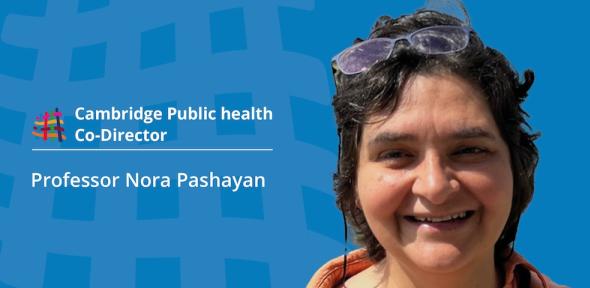
Submitted by Anonymous on Thu, 10/10/2024 - 12:39
We are excited to announce the appointment of Professor Nora Pashayan, Professor of the Epidemiology of Ageing, as a new co-director at Cambridge Public Health. A leading figure in cancer screening and public health, Professor Pashayan brings extensive experience and a deep commitment to advancing public health initiatives, building research capacity, and strengthening connections between research and practice.
In this interview, she shares her journey, research interests, and vision for the future of public health at Cambridge.
What sparked your interest in public health and cancer research?
During my residency training in family medicine at the American University of Beirut-Medical Centre, I developed a strong interest in cancer screening, particularly in detecting cancer earlier through opportunistic testing and exams. Contributing to research projects further deepened my interest, which led me to pursue a master’s in epidemiology at the London School of Hygiene & Tropical Medicine. It was then that I discovered the specialty of public health medicine, a natural fit that combined epidemiology with screening practices. I later completed by PhD at Cambridge in prostate cancer screening, and I’ve been committed to this field ever since.
What are your main research areas? Do you have any particular achievements?
My research focuses on risk-stratified cancer screening, where screening is tailored to individuals based on their risk of developing cancer. My work centres on three key areas: understanding the natural history of cancer to inform early detection strategies, evaluating benefit-harm balance and cost-effectiveness of screening strategies to inform policy, and implementation. I’m proud to have been among the first to publish in this field, showing how risk-stratified screening can improve the benefit-harm balance and cost-effectiveness of cancer screening programmes.
How does your research contribute to the broader public health landscape?
Prevention – both primary and secondary – is a key focus of public health. Improving cancer control, through tailored screening strategies, is essential for reducing the cancer burden, enhancing quality of life, improving population health, reducing healthcare costs, and promoting health equity.
What excites you most about joining Cambridge Public Health?
I am excited about the opportunity to continue the legacy of Professor Carol Brayne and to carry forward her vision in advancing Cambridge’s Public Health efforts though interdisciplinary research and collaboration. My hope is that CPH will enable multidisciplinary research that informs public health practice, which, in turn, will shape future research to maximise impact.

